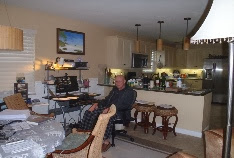Over the last few years I’ve been asked several times how to
create a book trailer on a limited budget. Of course if you can afford it, a
plethora of service providers who will do an excellent job is just a Google
search away.
If you have the time, learning how to create an acceptable
book trailer (non-Hollywood) at little or no cost is most likely at your
fingertips if your computer runs on a Windows operating system. To utilize the “Windows
Live Movie Maker” program, go to the “Start” icon in the bottom toolbar tray
and click "All Programs." It should be listed. If not, go to the Microsoft
website and search for the program; it was a free download the last time I
checked.
In brief, to get the most out of the WMM program, you will
need to collect freebie pictures, short video clips, verbal clips (sayings) and
music clips and arrange them—adding special effects from the menu within the
program—along a time-line that you
manage. To find these freebies, just Google them.
You can easily create your own audio/video clips using a typical
webcam; or use a recording device to make just audio clips. (If you have “Windows
Sound Recorder” within your operating system, you can use that.)
Book trailers can be posted to YouTube.com, your website,
your blog, and a multitude of other Internet websites you should join for
purposes of book promotion, e.g. appropriate Google Groups, Facebook, Twitter,
Google Plus, Amazon Author Central, Goodreads Groups, Library Thing Groups and
many other reader and reviewer websites when it is allowed.
To check out the WMM book trailers I’ve constructed for
three of my upcoming thrillers, go to “The Books” pages on my website: http://www.marshallchamberlain.com/thebooks.html.
Like I intimated, it’s not Hollywood, but I think they do a pretty good job demonstrating
a positive level of professionalism and credibility for your book. Just a note: I will be commissioning professionally created trailers for my thrillers as the second editions reach the marketplace over the 2013-2015 timeframe.
The following website offers good tips and tutorials and
answers most of the questions you may have as you go up the learning curve with
WMM: http://www.mightycoach.com/articles/mm2/index.html.
For those interested in fiction thrillers, the status of coming adventure-thrillers and other books under construction can be found on my website: www.marshallchamberlain.com.
For those interested in fiction thrillers, the status of coming adventure-thrillers and other books under construction can be found on my website: www.marshallchamberlain.com.
Cheers,
Marshall


